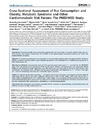Identificador persistente para citar o vincular este elemento:
https://accedacris.ulpgc.es/jspui/handle/10553/21151
| Título: | Cross-Sectional Assessment of Nut Consumption andObesity, Metabolic Syndrome and Other Cardiometabolic Risk Factors: The PREDIMED Study | Autores/as: | Ibarrola-Jurado, Nuria Bulló, Mónica Guasch-Ferré, Marta Ros, Emilio Martínez-González, Miguel Ángel Corella, Dolores Fiol, Miquel Wärnberg, Julia Estruch, Ramón Román, Pilar Arós, Fernando Vinyoles, Ernest Serra-Majem, Lluis Pintó, Xavier Covas, María Isabel Basora, Josep Salas-Salvadó, Jordi |
Clasificación UNESCO: | 3206 Ciencias de la nutrición | Palabras clave: | Nut Obesity Metabolic syndrome Cardiovascular risk |
Fecha de publicación: | 2013 | Publicación seriada: | PLoS ONE | Resumen: | Introduction: Prospective studies have consistently suggested that nut consumption is inversely related to fatal and non-fatal coronary heart disease. Limited data are available on the epidemiological associations between nut intake and cardiometabolic risk factors.Objective: To evaluate associations between frequency of nut consumption and prevalence of cardiometabolic risk factors [obesity, metabolic syndrome (MetS), type-2 diabetes, hypertension, and dyslipidemia] in a Mediterranean population at high cardiovascular risk.Materials and Methods: Cross-sectional study of 7,210 men and women (mean age, 67 y) recruited into the PREDIMED study. MetS was defined by the harmonized ATPIII and IDF criteria. Diabetes and hypertension were assessed by clinical diagnosis and dyslipidemia (high triglycerides, low HDL-cholesterol, and hypercholesterolemia) by lipid analyses. Nut consumption was assessed using a validated food frequency questionnaire and categorized as <1, 1-3, and >3 servings/wk. Control of confounding was done with multivariate logistic regression.Results: Compared to participants consuming <1 serving/wk of nuts, those consuming >3 servings/wk had lower adjusted odds ratios (OR) for obesity (0.61, 95% confidence interval 0.54 to 0.68; P-trend <0.001), MetS (0.74, 0.65 to 0.85; P-trend<0.001), and diabetes (0.87, 0.78 to 0.99; P-trend = 0.043). Higher nut consumption was also associated with lower risk of the abdominal obesity MetS criterion (OR 0.68, 0.60 to 0.79; P-trend<0.001). No significant associations were observed for the MetS components high blood pressure, dyslipidemia, or elevated fasting glucose.Conclusions: Nut consumption was inversely associated with the prevalence of general obesity, central obesity, MetS, and diabetes in subjects at high cardiovascular risk. | URI: | https://accedacris.ulpgc.es/handle/10553/21151 | ISSN: | 1932-6203 | DOI: | 10.1371/journal.pone.0057367 | Fuente: | PLoS ONE [ISSN 1932-6203], v. 8 (2), e5736 (Febrero 2013) | Derechos: | by-nc-nd |
| Colección: | Artículos |
Citas SCOPUSTM
104
actualizado el 08-jun-2025
Citas de WEB OF SCIENCETM
Citations
94
actualizado el 22-feb-2026
Visitas
62
actualizado el 23-sep-2023
Descargas
110
actualizado el 23-sep-2023
Google ScholarTM
Verifica
Altmetric
Comparte
Exporta metadatos
Los elementos en ULPGC accedaCRIS están protegidos por derechos de autor con todos los derechos reservados, a menos que se indique lo contrario.
